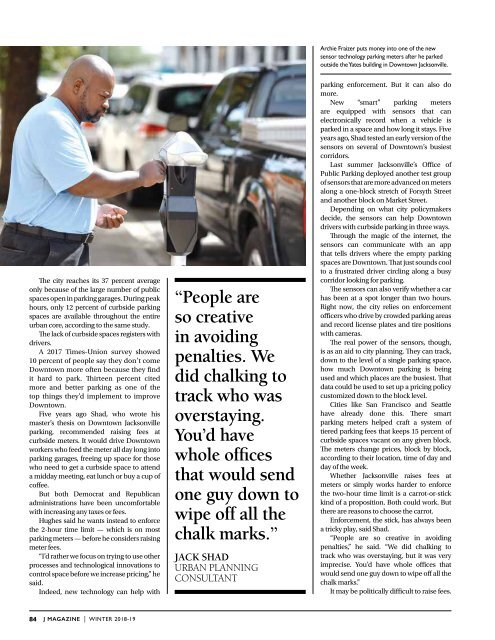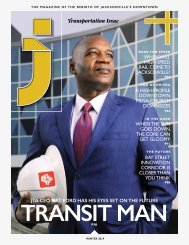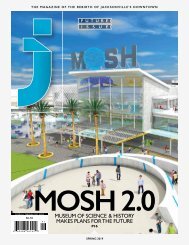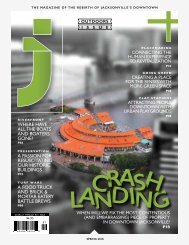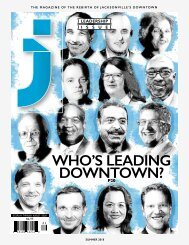J Magazine Winter 2018
Create successful ePaper yourself
Turn your PDF publications into a flip-book with our unique Google optimized e-Paper software.
Archie Fraizer puts money into one of the new<br />
sensor technology parking meters after he parked<br />
outside the Yates building in Downtown Jacksonville.<br />
The city reaches its 37 percent average<br />
only because of the large number of public<br />
spaces open in parking garages. During peak<br />
hours, only 12 percent of curbside parking<br />
spaces are available throughout the entire<br />
urban core, according to the same study.<br />
The lack of curbside spaces registers with<br />
drivers.<br />
A 2017 Times-Union survey showed<br />
10 percent of people say they don’t come<br />
Downtown more often because they find<br />
it hard to park. Thirteen percent cited<br />
more and better parking as one of the<br />
top things they’d implement to improve<br />
Downtown.<br />
Five years ago Shad, who wrote his<br />
master’s thesis on Downtown Jacksonville<br />
parking, recommended raising fees at<br />
curbside meters. It would drive Downtown<br />
workers who feed the meter all day long into<br />
parking garages, freeing up space for those<br />
who need to get a curbside space to attend<br />
a midday meeting, eat lunch or buy a cup of<br />
coffee.<br />
But both Democrat and Republican<br />
administrations have been uncomfortable<br />
with increasing any taxes or fees.<br />
Hughes said he wants instead to enforce<br />
the 2-hour time limit — which is on most<br />
parking meters — before he considers raising<br />
meter fees.<br />
“I’d rather we focus on trying to use other<br />
processes and technological innovations to<br />
control space before we increase pricing,” he<br />
said.<br />
Indeed, new technology can help with<br />
“People are<br />
so creative<br />
in avoiding<br />
penalties. We<br />
did chalking to<br />
track who was<br />
overstaying.<br />
You’d have<br />
whole offices<br />
that would send<br />
one guy down to<br />
wipe off all the<br />
chalk marks.”<br />
JACK SHAD<br />
URBAN PLANNING<br />
CONSULTANT<br />
parking enforcement. But it can also do<br />
more.<br />
New “smart” parking meters<br />
are equipped with sensors that can<br />
electronically record when a vehicle is<br />
parked in a space and how long it stays. Five<br />
years ago, Shad tested an early version of the<br />
sensors on several of Downtown’s busiest<br />
corridors.<br />
Last summer Jacksonville’s Office of<br />
Public Parking deployed another test group<br />
of sensors that are more advanced on meters<br />
along a one-block stretch of Forsyth Street<br />
and another block on Market Street.<br />
Depending on what city policymakers<br />
decide, the sensors can help Downtown<br />
drivers with curbside parking in three ways.<br />
Through the magic of the internet, the<br />
sensors can communicate with an app<br />
that tells drivers where the empty parking<br />
spaces are Downtown. That just sounds cool<br />
to a frustrated driver circling along a busy<br />
corridor looking for parking.<br />
The sensors can also verify whether a car<br />
has been at a spot longer than two hours.<br />
Right now, the city relies on enforcement<br />
officers who drive by crowded parking areas<br />
and record license plates and tire positions<br />
with cameras.<br />
The real power of the sensors, though,<br />
is as an aid to city planning. They can track,<br />
down to the level of a single parking space,<br />
how much Downtown parking is being<br />
used and which places are the busiest. That<br />
data could be used to set up a pricing policy<br />
customized down to the block level.<br />
Cities like San Francisco and Seattle<br />
have already done this. There smart<br />
parking meters helped craft a system of<br />
tiered parking fees that keeps 15 percent of<br />
curbside spaces vacant on any given block.<br />
The meters change prices, block by block,<br />
according to their location, time of day and<br />
day of the week.<br />
Whether Jacksonville raises fees at<br />
meters or simply works harder to enforce<br />
the two-hour time limit is a carrot-or-stick<br />
kind of a proposition. Both could work. But<br />
there are reasons to choose the carrot.<br />
Enforcement, the stick, has always been<br />
a tricky play, said Shad.<br />
“People are so creative in avoiding<br />
penalties,” he said. “We did chalking to<br />
track who was overstaying, but it was very<br />
imprecise. You’d have whole offices that<br />
would send one guy down to wipe off all the<br />
chalk marks.”<br />
It may be politically difficult to raise fees.<br />
84<br />
J MAGAZINE | WINTER <strong>2018</strong>-19


